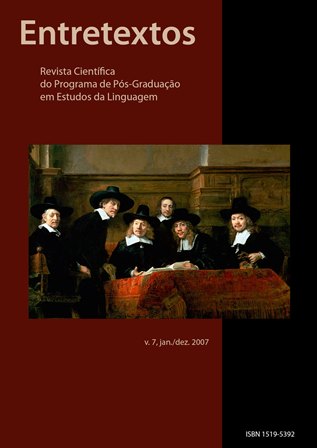A reflection on the constitution of socio-discursive practice in naming the motels
DOI:
https://doi.org/10.5433/1519-5392.2007v7n1p107Keywords:
Speeches, Society, CultureAbstract
This study has the objective to show that the names given to romance hotels more than identify them, but also reveals a cultural view of social practices that involves the historically situated individuals. For that, it will be taken as corpus data some restricted romance hotels' names in one city, having them useful for the accomplishment of a study based on the French discourse analysis, more specifically, on the interdiscourse concepts, memory and meaning effect. Also, it will be used the studies of Berger (1986) to follow up this search, as for him "the society structures become into the structures of our own conscience", as well as the definition of culture idea, once "If the man is, in fact, a symbolic animal, from that it is understood that he lives in a relative context of values, beliefs, concepts and, finally, symbolizations that constitute his culture" (SARTORI, 2001, p. 26), that is, then, what constitutes himself.Downloads
References
BERGER, Peter. Perspectivas Sociológicas: uma visão humanística. 25. ed. Trad. Donaldson M. Garschagen. Rio de Janeiro: Vozes, 1986.
CHEVALIER, Jean e GHERRBRANT, Alain. Dicionário de Símbolos: (mitos, sonhos, costumes, gestos, formas, figuras, cores, números). 20. ed. Rio de Janeiro: José Olympio, 2006.
HALL, Stuart. A identidade cultural na pós-modernidade. 8. ed. Rio de Janeiro: DP&A, 2003.
HILL,Telenia. Homem, cultura e sociedade. Rio de Janeiro: Lucena, 2006.
LARAIA, Roque de Barros. Cultura: um conceito antropológico. 19. ed. Rio de Janeiro,: Jorge Zahar, 2006.
ORLANDI, Eni P. Análise de Discurso: princípios e procedimentos.3. ed. São Paulo: Pontes, 2003.
ORLANDI, Eni P. As formas do silêncio: no movimento dos sentidos. 5. ed. São Paulo: Ed. Unicamp, 2002.
SARTORI, Giovanni. Homo videns: televisão e pós-pensamento. Trad. Antonio Angonese. São Paulo: EDUSC, 2001.
Downloads
Published
How to Cite
Issue
Section
License
Copyright (c) 2007 Entretextos

This work is licensed under a Creative Commons Attribution 4.0 International License.
Entretextos adota a Licença Creative Commons Attribution 4.0 International, portanto, os direitos autorais relativos aos artigos publicados são do/s autor/es.
Sob essa licença é possível: Compartilhar - copiar e redistribuir o material em qualquer suporte ou formato. Adaptar - remixar, transformar, e criar a partir do material, atribuindo o devido crédito e prover um link para a licença e indicar se mudanças foram feitas.
























